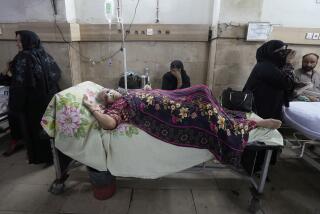Crisis-Plagued Karachi Teeters on Edge of Total Breakdown of Control : Pakistan: The teeming city is beset by crime, unemployment and political, ethnic and religious violence.
- Share via
KARACHI, Pakistan — When Karachi’s top official gets to the office, his sleeves are rolled up, his phones are ringing furiously and dozens of men are waiting in the sweltering hall to ask urgent favors.
There are no easy days for Faheem Khan as he tries to save one of the world’s most troubled cities.
“I’m surprised myself sometimes how the city carries on with all its problems,” Khan said in an interview with the Associated Press. “We have unemployment, crime and pollution. People are chasing each other through the streets with guns every day, but the city survives.”
Just barely, many people say. The congested, steamy port with 10 million residents has lurched from crisis to crisis in recent years and now a surge in political, ethnic and religious violence is threatening to get out of control.
Karachi’s woes have scared away foreign investors at a time when international money is pouring into Asia and fueling booms in much of the region. Karachi, like the rest of Pakistan, has seen little economic growth.
There are gun battles in the streets almost daily. The most serious conflict pits security forces against the Mohajir Qaumi Movement, a minority group that uses violence, strikes and other confrontational tactics to repeatedly paralyze Karachi, Pakistan’s business capital and biggest city.
The violence has killed hundreds of people the past few months and added to the general turmoil of a city suffering from frequent power blackouts, high unemployment and dawn-to-dusk traffic jams.
Khan, 33, was flying a helicopter for an air ambulance service until June, when Prime Minister Benazir Bhutto picked him as city administrator, the top government post.
She had wanted Abdul Sattar Edhi, who heads Pakistan’s only privately run emergency service and is often compared to India’s Mother Teresa because of his charity work. Edhi declined and suggested Khan, “one of my most trusted people.”
Khan has no government experience. But some say it is appropriate that a man versed in emergency rescues has been put in charge of Karachi.
The army was called in two years ago to assist Karachi police in trying to curb violence that has killed an estimated 4,000 people since 1986.
But the troops have not stopped the bloodshed or dampened the popularity of the Mohajir movement, which represents Muslims who migrated to Pakistan from India when the subcontinent was divided into two nations in 1947.
The Mohajirs account for a majority of Karachi’s population, but only about 10% of Pakistan’s 120 million people, and they feel shortchanged by fellow Muslims when it comes to jobs, education and political clout.
“The government does not consider Mohajirs to be sons of the soil,” said M.A. Jalil, one of the movement’s leaders. “They don’t feel we have the same rights as others.”
Security officers repeatedly round up Mohajir activists, and about 500 are now under some form of detention. The figure includes Jalil’s wife, Nasreen, a senator in the National Assembly who is under house arrest.
There are other feuds contributing to the city’s disorder. The Mohajir movement is itself split into two factions whose members often battle each other. Also, followers of the Shiite and Sunni Muslim sects ambush one another with regularity, and criminal gangs battle for turf in a city where underpaid and poorly trained police have little authority.
Bhutto, who has a house in Karachi’s well-to-do Clifton district, expressed shock at conditions when she spent a week in the city in July.
She chastised city officials and announced an aid package, but the federal government in Islamabad is chronically broke and few believe any real help is coming.
Karachi was a modest city of about 100,000 when Pakistan won independence from Britain 47 years ago. But a relentless inflow of unskilled migrants from the countryside increased the population a hundredfold, overwhelming the city’s ability to provide services.
Several million residents live in squalid slums that sprouted throughout the city. Social order broke down over the last decade as a tidal wave of guns and drugs flowed into Karachi from the civil war in Afghanistan.
The city is burdened by a bloated bureaucracy that many people view as incompetent and corrupt. Khan said he has been offered bribes as high as $300,000 for government contracts.
He was shocked to discover that only 12 of the city’s 54 firetrucks were in working order when he took office. He was dumbfounded when he learned the city was still paying for 800 full-time firemen--and many were getting overtime.
“This is how irrational our bureaucracy has become,” said Khan.
“I don’t want to stay in this job even one day more than necessary,” he added. “I just want to get back to flying my helicopter.”
More to Read
Sign up for Essential California
The most important California stories and recommendations in your inbox every morning.
You may occasionally receive promotional content from the Los Angeles Times.













